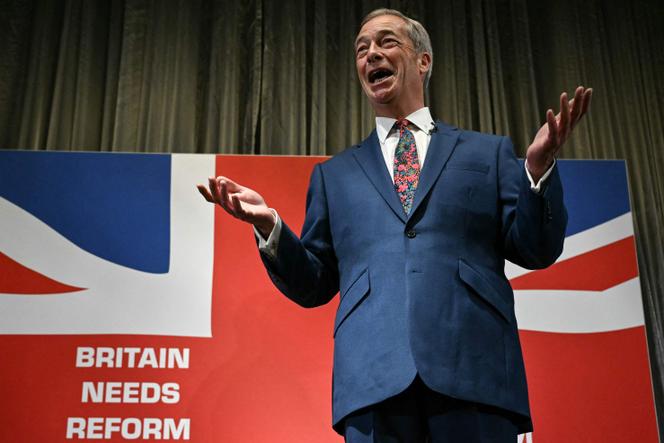


The British far-right Reform UK party is running a bizarre campaign. Following Rishi Sunak's announcement of snap elections on July 4, this party, initially founded in 2018 under the name Brexit Party), is certainly promising to "destroy" the Conservatives – and yet its honorary president and founder, the very charismatic Nigel Farage (ex-leader of UKIP), has made ambiguous remarks about a possible alliance with the Tories and is campaigning without being himself a candidate. Despite this muddled strategy, Reform UK is still hovering between 8% and 14% in the polls and intends to win back the votes of the (very many) disappointed Tories, or even those who find Labour, led by Keir Starmer, to have a platform that is far too centrist.
On Thursday, May 30, Richard Tice, the multimillionaire businessman who runs Reform UK (and largely funds it), summoned the press for his party's first major announcement in a former Thames-side warehouse converted into a conference center. "The British economy, our great economy, has a deadly, deadly addiction. That’s the harsh truth. It’s the drug of cheap overseas labor. ... What we need is a cure to this addiction," said this early Brexiter, who is running for MP in the Boston and Skegness constituency (central England). His miracle solution? A new tax that all employers would have to pay on all salaries paid to people who have immigrated to the UK.
This tax would have the effect, Tice believes, of limiting "mass" legal immigration to the UK, which is responsible, he asserts, for the stagnation of wages in the country. Net migration to the UK has indeed increased considerably since Brexit: according to figures published by the Office for National Statistics on May 24, the net number of people in 2023 was estimated to be 685,000, mostly on visas (work or student). "We are the only party that dares to tackle this issue head-on," said Tice, accusing the Conservatives, who have been in power since 2010, of having "betrayed Britain" (which voted for Brexit to, above all, limit migration) and considers that "the Tories and Labour are two sides of the same socialist coin" on the matter.
The atmosphere only livened up with the late, but masterfully orchestrated, arrival of Nigel Farage. At 60, the man regarded as the father of Brexit (which he was the first to promote in the 2000s) still attracts the cameras, even without standing for election – indeed he has already tried seven times to enter the House of Commons, each time unsuccessfully. The other party leaders – Rishi Sunak for the Conservatives, Keir Starmer for Labour – who are comfortably ahead in the polls? They are "boring" for the former UKIP leader. "Nobody voted for mass migration. Nobody got a say in it," agreed Farage, who, since Brexit went into effect in early 2020, has been trying to refocus his party on other issues, first and foremost migration and criticism of the UK's climate commitments.
You have 43.72% of this article left to read. The rest is for subscribers only.
